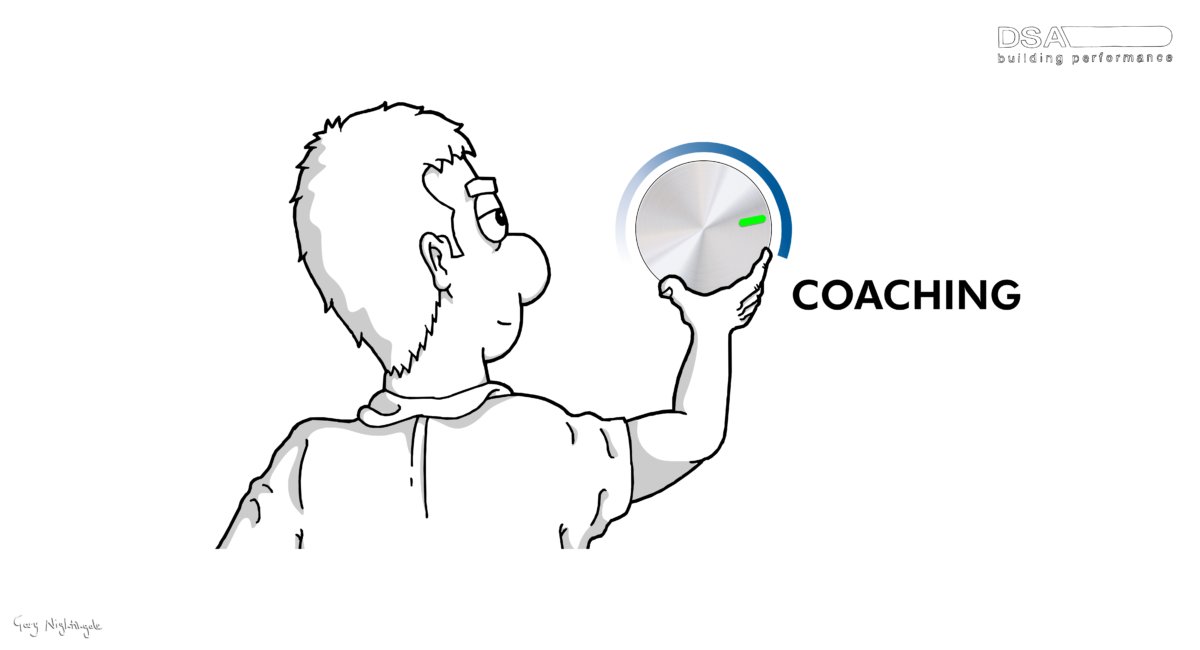Why I’m turning up the dial on coaching

I’m resetting my leadership team coaching approach by turning up the dial on coaching, and I mention it so that the teams I coach can know what to expect and how to prime the work.
What is coaching?
Coaching is a partnership to discover new thinking. Let me explain that.
The teams I work with want to get to a new place that is different from where they are now, so coaching is future-focussed.
It’s optimistic, too, because that future state is better than the current one.
To get to a better place something must change, because desirable change rarely happens on its own. So, teams have to do something: they have to muster energy and harness it to take new action.
I say new action because if we keep doing the same things, results stay the same and the status quo is perpetuated. To get to a different place we have to do different things.
Because thought precedes action, old thinking leads to old action, which means more of the same.
So, coaching is about discovering new thinking, leading to new action and movement towards the desired future state.
How to spot new thinking
Old thinking takes little effort. You already know your old thinking because you’ve thought it and articulated it many times.
It’s easy to spot. When people articulate old thinking, it comes out as smooth and slick as a sales pitch.
New thinking, on the other hand, is messy. You hesitate and backtrack. You falter, look to the heavens for guidance, scratch your head and fall silent.
I won’t interrupt that silence because I know you’re doing new thinking.
New thinking is often difficult for teams because it sparks friction, which can be uncomfortable. Sometimes people think a “good” team is one in which there is no disagreement.
But while everyone thinking the same looks impressive – “We are aligned,” they can say – groupthink is rarely new thinking and rarely useful.
So, coaching is a partnership to discover new thinking.
It’s not facilitation.
Why coaching is not facilitation
To facilitate is to make something possible or easy.
Imagine a team I’m preparing to coach. It’s already possible for this team to achieve what it wants to achieve, though they have to work out how to do it. I could try and tell them how, but I don’t know their situation; only they do.
Even if I could tell them how, it would be a mistake to do that because it would short circuit their work by denying them their new thinking.
If I was a facilitator, I would design a session with lots of interesting exercises and do it to them. If the exercises and tasks are well designed, the team would find them interesting.
When the energy in the room dropped I would get everyone to stand up and do an energizer, and we might get through the day with everyone engaged.
Was there any new thinking? Or was it merely interesting? Is anything really going to change?
As a coach working in partnership with the team, we would do it together. If my energy goes down, I would say “I notice my energy has gone down, is that the same for anyone else?”
I’d then ask, “what shall we do?”
Some of the team members might suggest an energizer and if the rest agreed we would do it. They are leading, they are doing the work.
As a coach, I establish and maintain a new-thinking environment for them to do their work, and I support and challenge them along the way so they work out what they need to do to keep moving forward towards where they want to be.
Often it’s difficult, frequently it’s fun. We learn along the way and their results are remarkable when they do the work.

